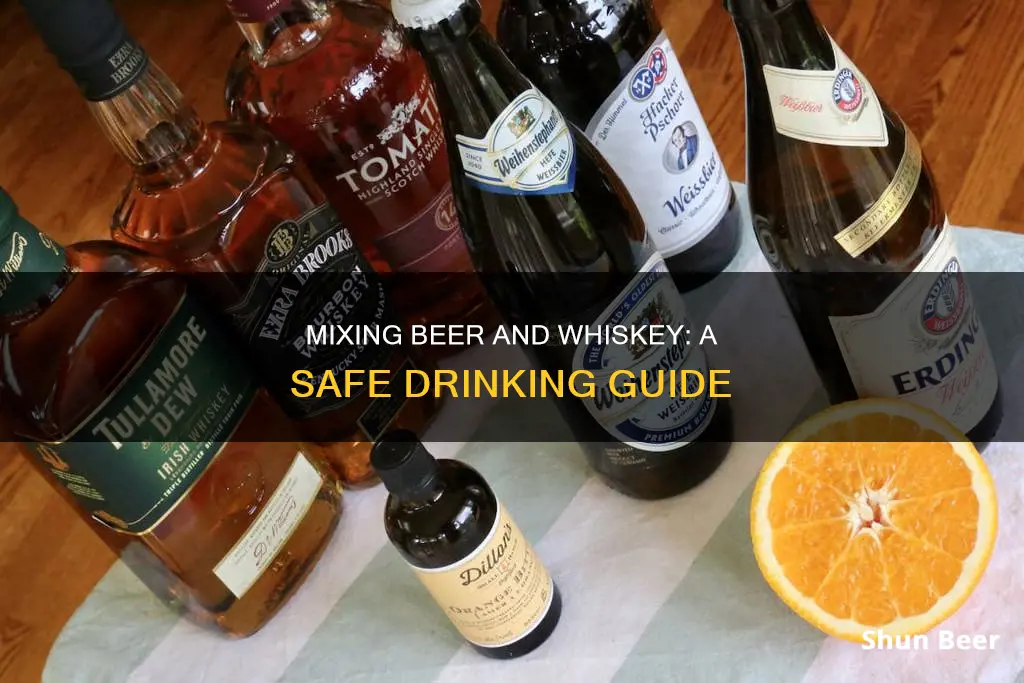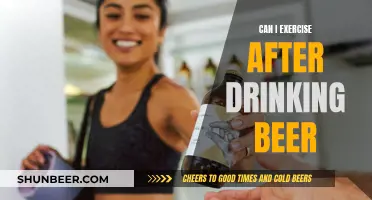
Drinking beer and whiskey together is known as a
| Characteristics | Values |
|---|---|
| Common names for the combination | Boilermaker, shot and a beer, beer and whiskey, beer and whisky |
| Origin | Butte, Montana, in the 1890s |
| How to drink | The liquor is consumed in a single gulp and chased by the beer, or the two are mixed by pouring or dropping the shot into the beer |
| Effects | According to some, drinking beer before liquor leads to sickness, while drinking liquor before beer is safer. However, experts say it is the amount of alcohol consumed that matters, not the order. |
What You'll Learn
- Beer and whiskey can be mixed in a cocktail called a boilermaker
- The order in which you drink beer and whiskey does not matter
- The 'beer before liquor' rule is a widely-known drinking myth
- Drinking beer and whiskey together will not make your hangover better or worse
- There are many other beer and whiskey pairings to try

Beer and whiskey can be mixed in a cocktail called a boilermaker
There are several ways to drink an American beer chaser. The traditional way is to consume the whiskey in a single gulp and then "chase" it with beer, which is sipped. The liquor and beer may also be mixed by pouring or dropping the shot into the beer, and the mixture may be stirred. If the shot glass is dropped into the beer glass, the drink is known as a depth charge.
In England, the term "boilermaker" refers to a cocktail with a half pint of draught mild mixed with a half pint of bottled brown ale, or a "brown split". In Scotland, a "half and a half" is a cocktail with a half pint of beer with a whisky, also known as "a wee hawf".
Enjoying Beer on Naples Beach: What You Need to Know
You may want to see also

The order in which you drink beer and whiskey does not matter
The "beer before liquor" rule is a well-known drinking adage that has been passed down through generations and interpreted in various ways. One common saying is, "Beer before liquor, never been sicker; liquor before beer, you're in the clear." Another version goes, "Whisky on beer, never fear. Beer on whisky, very risky." These sayings suggest that drinking beer before liquor will lead to a worse hangover or negative consequences. However, this is just a myth.
The truth is that your body can only process a certain amount of alcohol at a time. Whether you drink beer, whiskey, or any other type of alcohol, if you consume too much, you will end up with a hangover. The order in which you drink them does not change this fact. Mixing drink types will not make your hangover better or worse. It is the total amount of alcohol consumed that matters.
The "beer before liquor" rule may have persisted due to the typical progression of a night of drinking. When people start with beer, they tend to drink at a slower pace. As the alcohol takes effect, they may switch to liquor and increase their rate of consumption, leading to a higher risk of blacking out or experiencing a severe hangover. However, this is not inherent to the order of drinks but rather the result of increased alcohol consumption.
In conclusion, the order in which you drink beer and whiskey does not matter. The amount of alcohol you consume is the determining factor in how you will feel the next day. Drinking responsibly and in moderation is the best way to avoid negative consequences, regardless of the order in which you consume different types of alcohol.
The Best Beer to Drink: A Comprehensive Guide
You may want to see also

The 'beer before liquor' rule is a widely-known drinking myth
The "beer before liquor" rule is a widely-known drinking myth. The saying goes, "Beer before liquor, never been sicker; liquor before beer, you're in the clear." This adage has been passed down through generations of drinkers, but it is not based on chemistry or any other scientific principle. Rather, it is based on the idea that starting with beer and then switching to liquor will cause a faster increase in alcohol consumption, leading to negative consequences.
However, this myth has been debunked by experts, who assert that the order of drinks does not matter. The amount of alcohol consumed and the rate of consumption are the key factors in determining the severity of a hangover or other negative effects. Mixing different types of alcohol does not inherently lead to worse outcomes.
The persistence of the "beer before liquor" myth can be attributed to the fact that beer typically has a lower alcohol content than liquor. Therefore, if someone starts with beer and then switches to liquor, they may end up consuming more alcohol overall and increasing their drinking pace. This can lead to blackouts, hangovers, and other unpleasant experiences.
Additionally, the carbonation in beer can also play a role in how alcohol is absorbed into the body. Carbonated drinks can agitate the lining of the small intestine, causing alcohol to enter the bloodstream faster. However, this effect is not significant enough to cause a hangover on its own.
In conclusion, the "beer before liquor" rule is a myth that has been perpetuated by drinkers' observations and experiences. While there may be some anecdotal evidence to support it, the ultimate determinant of how a night of drinking will affect someone is the total amount of alcohol consumed and the rate at which it is consumed. To avoid negative consequences, it is important to pace oneself and drink responsibly.
Explore Anna Maria Island's Beer-Friendly Culture
You may want to see also

Drinking beer and whiskey together will not make your hangover better or worse
Drinking beer and whiskey together is a popular combination. The "boilermaker", or the "shot and a beer", is a well-known pairing in the US, and has become a blue-collar institution. In the UK, the term "boilermaker" refers to a different pairing of drinks.
There is a common saying that goes, "Beer before liquor, never been sicker. Liquor before beer, have no fear." This saying is often misunderstood, and people often get it wrong. However, it is not based on chemistry or any other scientific phenomenon. Rather, it comes from the wisdom of generations of drinkers and their observations.
The saying is based on the idea that if you start your night with a few beers, you will take your time to finish them. But as the alcohol starts to take effect, you will find yourself drinking faster. If you then switch to whiskey, not only have you increased your drinking speed, but you have also increased the amount of alcohol you are consuming by 30-40% per drink. This is a sure way to end up with a nasty hangover.
On the other hand, if you start with whiskey, you will need fewer drinks to get to the same level of drunkenness, and when you switch to beer, you will be decreasing the amount of alcohol you consume per drink. This will help you avoid a hangover and keep your wits about you.
However, it is important to note that the order in which you drink beer and whiskey does not actually affect whether or not you will get a hangover. The amount of alcohol you consume is the determining factor. Your body can only process a certain amount of alcohol at a time, and if you exceed that, you are likely to wake up with a hangover, regardless of the order in which you drank your beverages.
Beer and Covid Shots: What You Need to Know
You may want to see also

There are many other beer and whiskey pairings to try
- For a classic American "shot and a beer", pair a nice, fat, corn-led bourbon with an American red ale, or, for something lighter and hoppier, try a Sierra Nevada Pale Ale.
- For a Canadian twist, combine Canadian Club with a ginger-prominent beer, such as Williams Bros. Midnight Sun.
- If you're after an Irish whiskey, go for a brown ale with malty, nutty flavours, or, for something gentler, a German weissbier.
- To complement a peaty whisky like Lagavulin, try a German rauchbier, or go for a contrasting beer like a hoppy IPA or a rich, complex stout.
- Speyside whiskies with warming, fruity flavours pair well with a traditional 80 shilling; try Alchemy's Ten Storey Malt Bomb.
- For a blended whisky like Famous Grouse, it's open season; go for something light and gentle, like a session lager.
So, there you have it! Plenty of beer and whiskey pairings to experiment with and enjoy. Just remember to drink responsibly and always follow the advice of the experts: it's not the order in which you consume your drinks that matters, but the amount.
Non-Alcoholic Beers: A Safe Alternative?
You may want to see also
Frequently asked questions
Yes, it is safe to drink beer and whiskey together. In fact, this combination is known as a boilermaker or a shot and a beer. The drink originated in Butte, Montana, in the 1890s, and was originally called a Sean O'Farrell.
Traditionally, the whiskey is consumed in a single gulp and is then "chased" by the beer, which is sipped.
Yes, there are several traditional pairings of beer and whiskey from around the world. For example, the German pairing of Korn (grain brandy) and beer is called a Herrengedeck or "gentlemen's menu", while the Scottish pairing of a half pint of beer with a whisky is called a "half and a half".
No, that is just a myth. The order in which you consume your drinks does not matter. It's the amount of alcohol you drink that determines whether or not you will have a hangover.







